Written by Laurie Risner, PhD
The 4th Annual NRMN-CAN Professional Development and
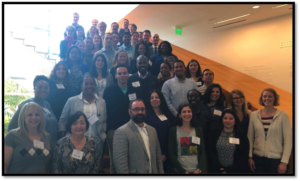
NRMN-CAN Participants at the 4th Annual NRMN-CAN Professional Development and Grantwriting Conference, September 30 – October 2, 2018.
Grantwriting Conference, “Passport to Success: From Management to Grantsmanship” was held on September 30 – October 2, 2018 at the Big Ten Conference Center in Rosemont, IL. The 55 attendees from Big Ten Academic Alliance institutions included 30 postdoctoral and junior faculty trainees, 7 faculty grantwriting coaches, and 18 NRMN-CAN guest speakers and committee representatives.
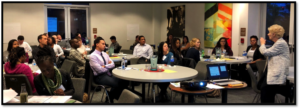
Dr. Nancy Schwartz of the University of Chicago welcomes the postdoc and junior faculty attendees to the Fall 2018 NRMN-CAN Professional Development and Grantwriting Conference.
This year’s participants were invited from the pool of past NRMN-CAN conference attendees who were interested in returning for another round of NRMN-CAN programming. Welcomed back to the Big Ten Conference Center were 18 junior faculty members and 12 postdoctoral researchers (57% under-represented), who had all participated in a previous NRMN-CAN Professional Development and Grantwriting Conference or Postdoc Mentor Training Workshop in the past three years. Several of this year’s participants had initially participated in NRMN-CAN as postdocs, but are now appointed with faculty positions, which was inspiring to see. This year’s NRMN-CAN conference and grantwriting kick-off was designed as a second level of programming with the more advanced returning trainee in mind. The professional development theme of the NRMN-CAN conference was Leadership and Management, and the workshops and speakers were selected by this year’s conference program co-chairs: Phil Clifford, PhD, Professor and Associate Dean of Research in the College of Applied Health Sciences at the University of Illinois at Chicago and Imogen Hurley, PhD, Director, Office of Postdoctoral Studies at the University of Wisconsin-Madison.
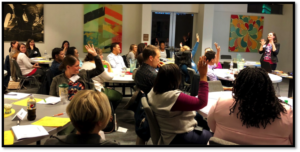
Jessica Swenson of the Leadership@UW initiative at the University of Wisconsin-Madison builds the group’s leadership and interpersonal skills.
The conference opened with a networking reception on Sunday evening, September 30, 2018 in the Aloft Hotel which gave participants time to reconnect with past NRMN-CAN contacts as well as make new ones. The reception was immediately followed by the opening workshop, “Exploring Leadership and Discovering Your Interpersonal Style”, which was led by Jessica Swenson, of the Leadership@UW initiative at the University of Wisconsin-Madison. This workshop introduced the concepts of leadership and helped participants to understand their own personal leadership style as well as how to best interact with the style of others in an interactive and engaging way. One junior faculty participant summarized the session as an “excellent workshop with very informative (material) on interpersonal styles that will be helpful when interacting with others and improving the likelihood of successful collaborations.”
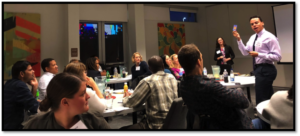
NRMN-CAN participants engage in workshop learning activities.
The professional development portion of the conference continued on Monday morning with the next workshop, “Manage the work; Lead the People” led by Kevin Grigsby, DSW, Senior Director of Member Organizational Development at the Association of American Medical Colleges. Dr. Grigsby’s workshop focused on leadership and management skills and resources, and how to best manage a team in the academic and scientific realms. An Assistant Professor in the group commented,
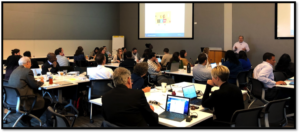
Dr. Kevin Gigsby of the AAMC presents “Manage the work; Lead the People” on October 1, 2018.
“It was invaluable to talk about the soft skills portion of our work and how to manage those on our projects. There is an abundance of information given on the content of what we do, but little on the how to successfully manage and lead the people working on our projects. Infinitely valuable.” Another junior faculty member remarked that they “learned the difference between a manager and a leader and how to apply certain “techniques” to excel at both. This presentation was interactive and engaging. Loved it!”
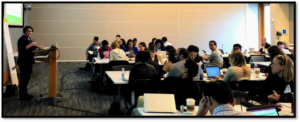
Dr. Susan Johnson of the University of Iowa discusses time management skills for maximum productivity.
The management theme continued in the next workshop on Time Management, led by Susan Johnson, MD, Professor of Obstetrics and Gynecology and Epidemiology at the University of Iowa. Dr. Johnson’s presentation covered strategies to reduce everyday stress in the workplace and how to become a more productive writer, which was a perfect prelude to the grantwriting sessions on the next day of the conference. “My favorite part (of Dr. Johnson’s workshop) was how to learn to be a more productive writer, which I’m currently employing,” commented a junior faculty participant.
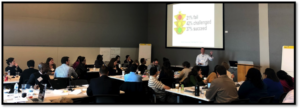
Jay Johnson of the Ohio State University presents a workshop on Project Management.
The final guest lecture on Monday was led by Jay Johnson, Associate Director of Institutional Research and Planning at the Ohio State University, who discussed Project Management. This workshop covered the basics of formal project management including the tools and activities needed for successful project completion. One participant remarked that the workshop was “very helpful in giving tools on how to deal with project management. His material was incredibly beneficial, and how to manage projects is rarely addressed in academic settings.
The final professional development session of the day was a Faculty Panel Discus
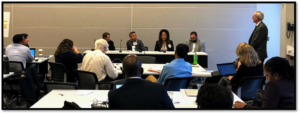
The NRMN-CAN faculty panel discussion featured successful NRMN-CAN faculty.
sion which focused on: “Best Practices for Starting and Running a Successful Research Group”. The panel was comprised of a senior faculty grantwriting coach, Cara-Lynne Schengrund, PhD, of Penn State University, and new junior faculty attendees who have all recently successfully attained funding for their own laboratories: Ronke Olabisi, PhD, of Rutgers University, Alfredo Garcia, PhD from the University of Chicago, and José Rodríguez-Martínez, PhD, a former postdoc from the University of Wisconsin-Madison who is now on the faculty at the University of Puerto Rico. This panel discussion was facilitated by Phil Clifford, PhD, and covered the challenges of being a new professor as well as helpful advice on how to best approach the hurdles of getting a new faculty position, starting up a lab, and working toward tenure. One participant commented that the panel “motivated me in a way that I felt no matter what, if you persist and work (hard), you can reach your goals.” Another said, “The portion of the talk discussing the importance of negotiating and hearing similar struggles among other junior faculty was incredibly beneficial.”
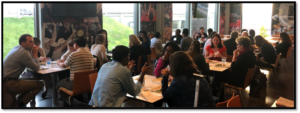
NRMN-CAN conference participants enjoy time to network with their Big Ten colleagues.
The day concluded with a networking reception in the Big Ten Conference Center which gave the participants time to de-brief from the day’s sessions and continue to strengthen their connections facilitated through NRMN-CAN.
Next, the conference theme shifted to grantwriting. Rick McGee, PhD, Professor and Associate Dean for Faculty Recruitment & Professional Development at Northwestern University Feinberg School of Medicine led a session on Monday evening for the faculty grantwriting coaches to review the Northwestern/NRMN approach to grantwriting. Attending the meeting were four returning and two new NRMN-CAN grantwriting coaches. In addition, three other experienced NRMN-CAN coaches who could not be present at the conference are set to lead grantwriting groups on their campuses.
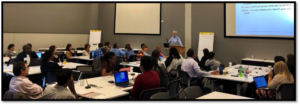
Dr. Rick McGee of Northwestern University leads the Grantwriting instruction and group kick-off.
On Tuesday, October 2, 2018, Dr. Rick McGee started the day off with a workshop titled, “Successful Grant Writing Part II: A Deeper Dive into the Context of Review, Resubmissions, Ks and Engaging with Program Officials.” As most of the participants had attended a previous NRMN-CAN grantwriting kick-off led by Dr. McGee, and many are now working on revised grant proposals, Rick McGee updated the introductory presentation this year to include advice on how to approach grant revisions and resubmissions. The group found the session “very helpful in terms of thinking about how to frame your grant proposal and … on when/how to contact program officers.”
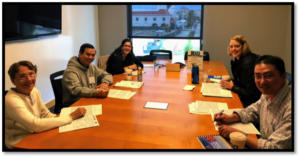
NRMN-CAN grantwriting groups get to work on grant applications.
After Dr. McGee’s instructive introduction, the participants broke out into seven grantwriting groups to get to work on their grant proposals along with their faculty coaches. Most NRMN-CAN participants are currently working on a NIH “K” or “R” series grant for submission this year or early next year. Participants found their conference grantwriting group meetings “extremely helpful– I got a lot of great advice for my grant and I also learned a lot by reading and giving advice to others on their grants. It really helped to talk things out and see what areas needed more clarity.” Another mentioned, “I’m excited about using the groups as a tool to better my work. I think the methods of review are extremely useful to keep my writing on track and focused.” Participants left the conference with future grantwriting group meetings planned, and the groups will continue meeting until their grants get submitted.
Overall, the conference attendees found the NRMN-CAN conference to be a highly impactful event for their professional academic careers. One participant summarized that she, “learned how to manage better time, how to act to be a future successful leader and manager, and I got to see people I had met at previous conferences again and meet new people. Currently I’m now engaged in preparing my next grant with my grantwriting group.”